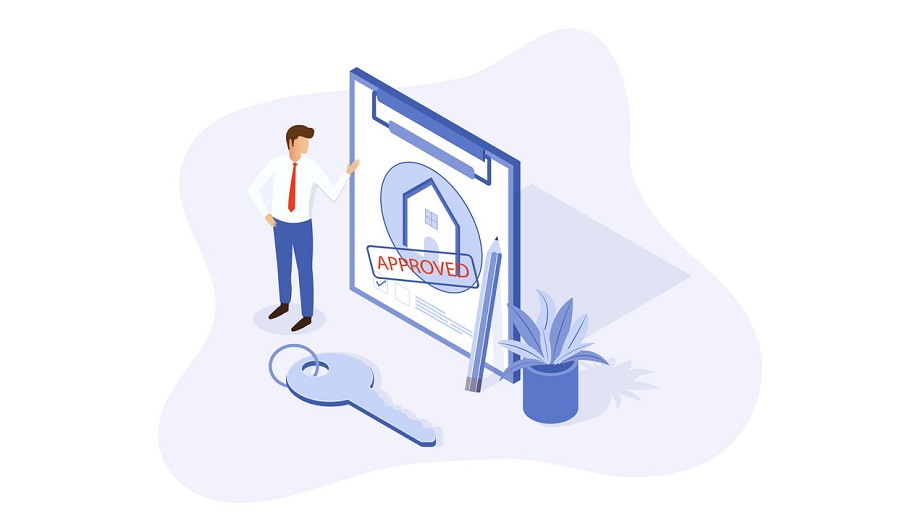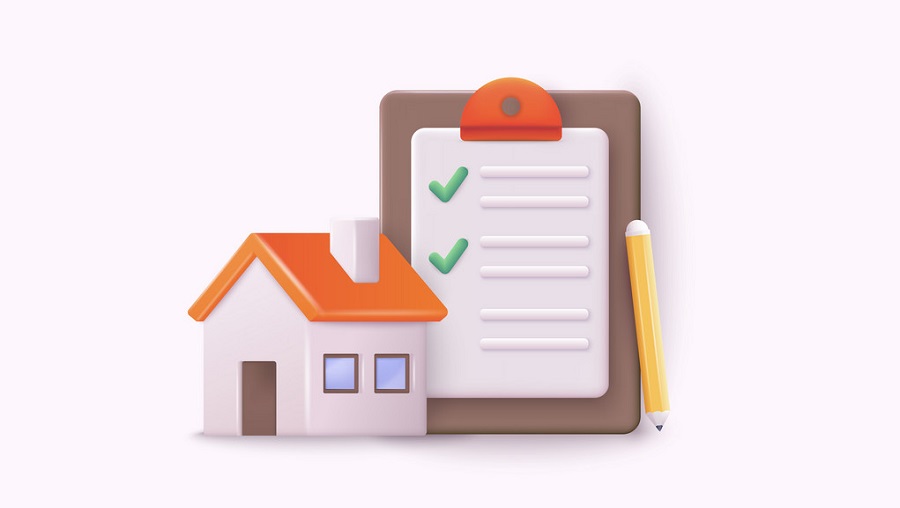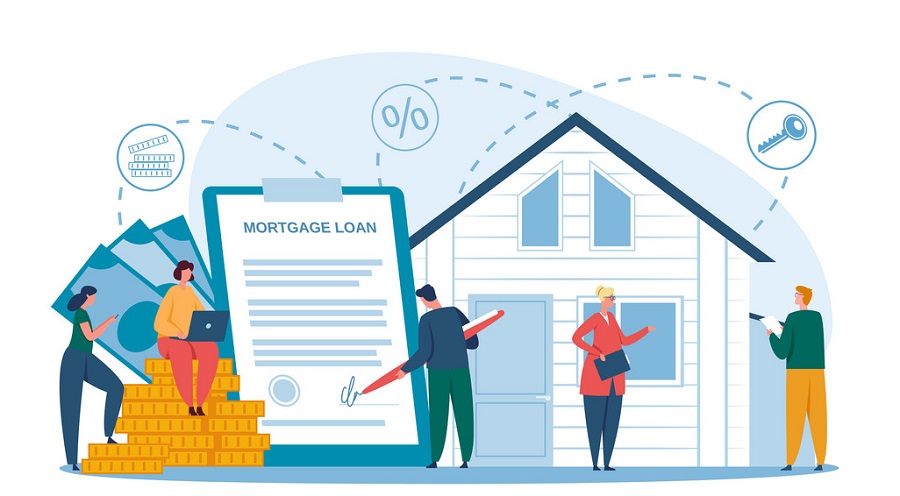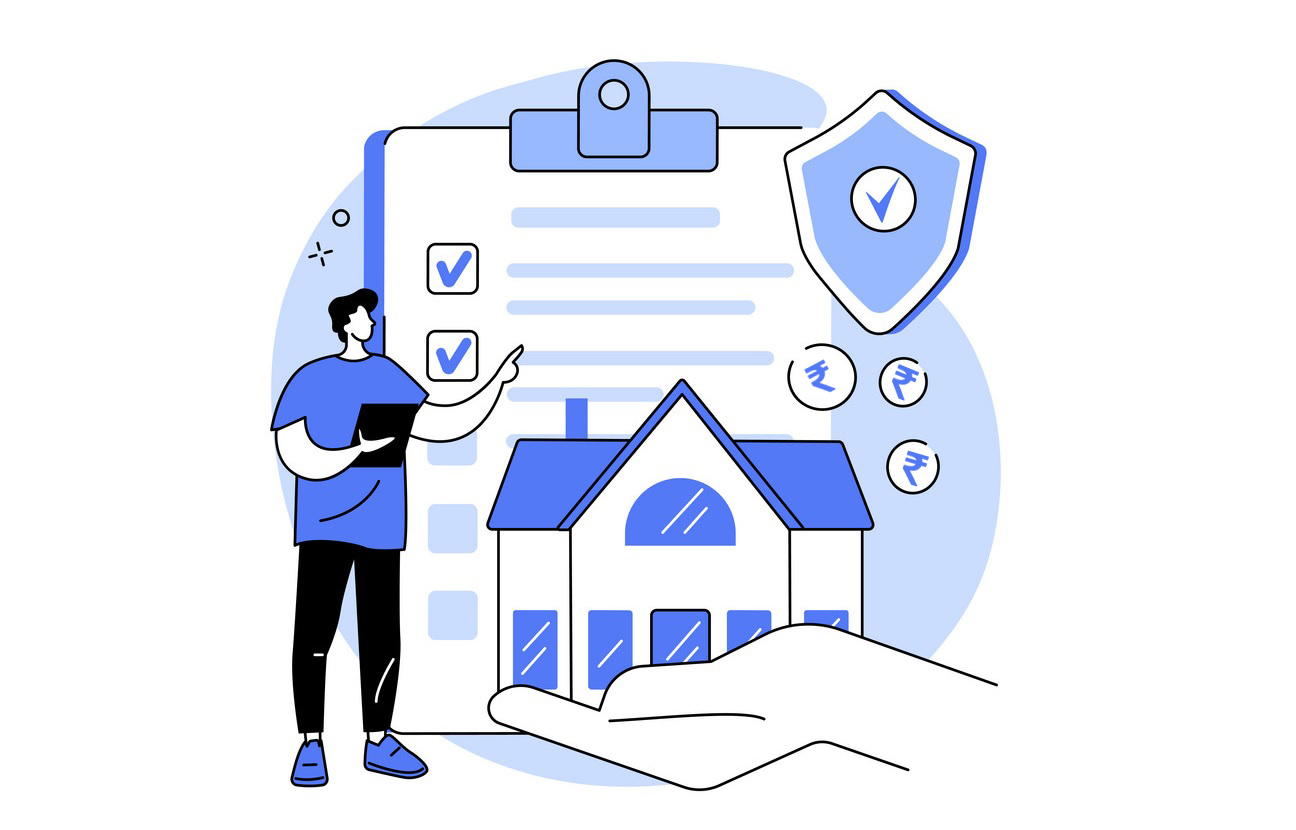Tag: secured mortgage loan

Chasing claiming a home, one often embarks on the excursion of getting a home loan. This financial responsibility fills in as a foundation for many individuals and families, transforming the dream of homeownership into a tangible reality. With the advent of innovation, the process of applying for a home loan has developed significantly, making it more accessible and helpful than at any other time in recent memory. In this digital age, to apply for home loans online has turned into the preferred course for many aspiring homeowners, offering effectiveness, transparency, and ease of access.
How Easy It Is to Apply for a Home Loan Online
Gone are the days of extensive paperwork and vast queues at the bank. To apply for home loan online has changed the loaning process, offering unparalleled convenience at each step. With only a couple of snaps, planned homebuyers can initiate their loan application from the comfort of their homes or offices, eliminating the requirement for numerous visits to the bank or financial foundation.
Streamlined Application Process
The online application process for a home loan is intended to be user-friendly and intuitive, directing applicants through each stage with no sweat. From finishing up basic personal and financial information to uploading essential documents, the digital platform guarantees a seamless encounter from start to wrap-up. Also, applicants can track the status of their application in real-time, giving them valuable bits of knowledge about the advancement of their loan approval.
Accessibility and Flexibility
One of the main advantages to “Apply For Home Loan“ online is the unparalleled accessibility it offers. Dissimilar to traditional banking hours, online platforms are available all day, every day, allowing applicants to present their applications at their convenience without being constrained by time or location. This flexibility engages individuals to take control of their financial future based on their conditions, eliminating unnecessary delays in the loan approval process.
Enhanced Transparency and Information
Transparency is key with regard to financial transactions, and online home loan applications focus on this aspect by giving applicants comprehensive information constantly. From financing costs and loan terms to repayment schedules and associated fees, all relevant details are clearly illustrated for applicants to review and evaluate. This transparency encourages trust and trust in the loaning process, guaranteeing that borrowers are completely informed before focusing on a home loan.
Secure and Confidential
Security is paramount in the digital landscape, especially with regard to delicate financial information. Online home loan applications utilize strong encryption protocols and safety efforts to safeguard applicants’ personal and financial data, guaranteeing confidentiality and peace of mind in the meantime. With rigid data insurance standards in place, applicants can have confidence that their information is safe and secure from unauthorized access or breaches.
Efficient Document Submission
One of the advantages to “Apply For Home Loan Online“ is the efficient document submission process. Through secure online portals, applicants can upload required documents like identification, income statements, and asset details without the requirement for physical duplicates or in-person visits to the bank.
Instant Pre-Approval
Online home loan applications often give the choice of instant pre-approval, providing applicants with an initial assessment of their qualifications and borrowing capacity in practically no time. This preliminary approval enables imminent homebuyers to certainly investigate their choices and initiate the home purchasing process with a clear understanding of their financial standing.

In the unique landscape of financial planning, people frequently end up needing significant funds for different reasons like business expansion, education, or medical crises. In such situations, one road that stands out is a Loan against property (LAP). This financial instrument permits people to leverage the value of their property to get a loan. In this blog, we will explore the subtleties of Loan against property and dig into the fundamental part of “LOAN AGAINST PROPERTY ELIGIBILITY CRITERIA“.
Understanding Loan against property
A Loan against property, usually known as LAP, is a secured loan that empowers borrowers to involve their possessed property as collateral to get funds. The property could be residential or commercial, giving a versatile supporting arrangement. The borrower holds ownership of the property yet promises it as security, diminishing the gamble for the lender and frequently bringing about favorable interest rates contrasted with unsecured loans.
Key Highlights of Loan against property
1. Secured Nature: LAP is a secured loan, and that implies the lender has a substantial asset (property) as collateral, decreasing the gamble of default.
2. Versatile Usage: Funds gained through LAP can be utilized for different purposes, including business expansion, education, medical expenses, or even debt solidification.
3. Longer Tenure: LAP normally offers longer repayment tenures, permitting borrowers to manage their finances more comfortably.
4. Competitive Interest Rates: Because of the secured nature of LAP, interest rates are, for the most part, lower contrasted with unsecured loans, making it an alluring choice for those looking for affordable funding.
Loan against property eligibility criteria
While LAP presents a feasible funding choice, it’s critical to understand the eligibility criteria to get the endorsement. Lenders assess a few factors to decide a borrower’s Loan against property eligibility –
1. Property Ownership and Type: The essential eligibility model is property ownership. The borrower should be the legal proprietor of the property and, contingent upon the lender, it very well may be either residential or commercial.
2. Age Criteria: Lenders ordinarily set a base and greatest age limit for loan applicants. The age criteria might fluctuate. However, it typically ranges from 18 to 65 years.
3. Income Stability: Lenders evaluate the borrower’s income stability and repayment limit. A consistent income stream is essential to guarantee convenient repayments.
4. Credit History: A decent credit score upgrades the possibilities of loan endorsement. Lenders survey the borrower’s credit history to measure their creditworthiness.
5. Loan-to-Value Ratio (LTV): LTV is the ratio of the loan added up to the property’s value. Lenders normally offer loans up to a specific percentage of the property’s value, and a higher LTV might influence eligibility.
6. Employment and Business Stability: For salaried people, employment stability is significant, while independently employed people need to demonstrate business stability. This grants the borrower’s capacity to meet repayment commitments.
Loan against property Application Process
Whenever you’ve looked into the idea of a “LOAN AGAINST PROPERTY“ and affirmed your eligibility, the following stage is exploring the application process. The method, as a rule, includes submitting significant documents, for example, property papers, income proof, identity proofs, and others. Numerous lenders work with an online application process, making it helpful for applicants to transfer important documents and track the situation with their application.
Document Checklist for Loan against property
To smooth out the application process, gathering a far-reaching set of documents is critical. Generally required documents incorporate property papers, income tax returns, salary slips, bank statements, and identity proofs. Guaranteeing all documents are all together improves the effectiveness of the endorsement process.
Loan against property Interest Rates
One key factor that essentially influences the expense of borrowing is the interest rate. The interest rates for loans against property can be either fixed or floating. While fixed rates provide stability, floating rates fluctuate with market conditions. Understanding the ramifications of each and picking a reasonable choice in light of your financial strategy is vital for long-haul financial planning.

In today’s fast-paced world, innovation has revolutionized various aspects of our lives, including the way we apply for financial products like home loans. To apply for a home loan online has become increasingly popular because of its convenience and productivity. In this guide, we will walk you through the step-by-step process of how to apply for a home loan online.
Research and Compare Lenders
Before getting into the process of online application to “Apply For A Home Loan“ it’s essential to research and compare several lenders. Search for reputable financial institutions that offer cutthroat interest rates, favourable terms, and reliable customer service. Online reviews and testimonials can give valuable insights into the experiences of other borrowers.
Check Eligibility Criteria
Each lender has specific eligibility criteria for Home Loan seeker. Checking these criteria before proceeding with the application is crucial. Common factors include age, credit score, income, and employment status. Make sure you meet the requirements of the chosen lender.
Gather Necessary Documents
In request to maximize the online application technique, aggregating all essential documents in advance is advisable. These typically consist of evidence of personality, confirmation of address, verification of income, verification of employment, and verification of property. Possessing these documents in advance can speed up the application process.
Visit the Lender’s Website
Once you’ve selected a suitable lender and ensured you meet their eligibility criteria, visit their official website to “Apply For A Home Loan Online“. Please navigate to the home loan section, where you’ll find information about the various types of home loans they offer.
Use the Online Loan Calculator
Most lenders give an online loan calculator on their websites. Use this tool to estimate your monthly EMI (Equated Monthly Installment) based on the loan amount, tenure, and interest rate. This can assist you with planning your finances and choosing an affordable loan.
Fill in the Online Application Form
Locate the online application form on the lender’s website and fill in the expected details accurately. Be prepared to give information about your details, financial history, and the property you intend to purchase. Take your opportunity to ensure all details are placed accurately.
Upload Documents Securely
Many lenders allow you to upload the expected documents straightforwardly through their online portal. Ensure that the documents are clear, decipherable, and in the specified format. This step is crucial for the lender to confirm your information and process your application.
Wait for Verification and Approval
After submitting the online application and documents to apply for a home loan, the lender will initiate the verification process. This may involve checking your credit score, employment details, and property documents. Once the verification is finished, you will get an approval or rejection notification.
Review Loan Terms and Conditions
Assuming that your application is approved, carefully review the loan terms and conditions given by the lender. Pay attention to the interest rate, tenure, processing fees, and any other relevant terms. Before proceeding, seek clarification on any points that remain ambiguous.
Sign the Loan Agreement
Once you are satisfied with the terms, you’ll be expected to sign the loan agreement electronically. Ensure that you understand all clauses and obligations outlined in the agreement. This step is legally binding, so take an opportunity to read through the archive completely.

Chasing after satisfying dreams, financial constraints often present significant obstacles. Whether it’s expanding a business, funding education, or managing unanticipated expenses, the requirement for substantial funds can arise suddenly. During such occasions, leveraging assets like property can be a reasonable option, and a Loan against property (LAP) arises as a viable arrangement.
Understanding Loan against property
What is a Loan against property (LAP)?
A Loan against property is a tied-down loan that allows individuals to get funds by mortgaging their property. It very well may be a residential or commercial property, filling in as collateral for the loan amount sanctioned by financial establishments.
Eligibility Criteria and Documentation
Financial foundations think about various factors prior to approving a “Loan against property“ including the property’s value, the applicant’s income, age, credit score, and repayment capacity. Documentation typically incorporates property papers, income proof, identity and address proofs, and bank statements.
Benefits of Loan against property
Higher Loan Amounts: Compared to unstable loans, LAP offers substantially higher loan amounts. The loan quantum is not set in stone by the property’s value and the borrower’s eligibility criteria.
Lower Interest Rates: If you are against property, LAP will, in general, offer lower interest rates compared to unstable loans like personal loans or credit cards. The interest rates are typically fixed or floating, contingent upon the moneylender’s terms.
Flexible Repayment Options: LAP gives flexible repayment options, allowing borrowers to pick between fixed or floating interest rates and longer repayment tenures. This adaptability eases the weight of repayment, guaranteeing affordability.
Versatile Usage: The acquired amount from a Loan against property can be used for various purposes like business expansion, education, medical expenses, debt consolidation, or any other financial prerequisites.
Understanding Loan against property EMIs
What are EMIs?
Equated Monthly Installments (EMIs) are fixed payments made by borrowers to repay the loan amount along with the interest over a foreordained period. The EMI amount remains constant all through the repayment tenure.
Factors Affecting Loan against property EMIs
• Loan Amount: A higher loan amount results in higher “Loan against property EMIs“.
• Interest Rate: Higher interest rates lead to higher EMIs.
• Loan Tenure: Longer tenures lessen the EMI amount but increase the overall interest payout.
• Credit Score: A borrower’s creditworthiness plays a pivotal job. A higher credit score often brings about lower interest rates, like this affecting the EMI amount decidedly.
• Type of Interest Rate: Selecting a fixed or floating interest rate unexpectedly impacts EMIs. While fixed rates offer stability, floating rates may lead to fluctuations in EMIs based on market conditions.
• Processing Fees and Other Charges: Additional fees, like processing charges, administrative fees, or insurance premiums, can marginally increase the overall EMI amount. Understanding these charges is essential while assessing loan affordability.
Managing Loan against property EMIs
Budget Planning: Create a powerful budget plan that accommodates the EMIs comfortably without straining your finances. Think about your income, expenses, and other financial obligations while planning.
Prepayment Option: A few banks offer the adaptability of prepayment or part-payment of the loan amount. Use any surplus funds to diminish the outstanding principal amount, in this way decreasing the overall interest payout.
Avoiding Default: Guarantee convenient payment of EMIs to avoid penalties and adverse consequences for your credit score. Defaulting on payments can lead to the moneylender initiating legal action and eventual property abandonment.

The acquisition of a home financing is a critical achievement on the path to homeownership. Online home loan applications have become more streamlined and accessible because of the conveniences of the digital age. This guide elucidates the techniques entailed to apply for home loan online, thereby enabling individuals to begin the process of becoming owners effortlessly.
The Home Loan Online Application Process
• Research and Preparation: Before beginning the online application to “APPLY FOR HOME LOAN“ incorporate necessary documents, for example, identification, proof of income, property details, and credit history. A strong application is predicated on your insight into your financial situation and the sort of loan you genuinely want.
• Selecting the Right Lender: Investigate the various lenders that give online home loan administrations. By comparing interest rates, repayment terms, and customer reviews, one can recognize a reputable lender who meets their particular requirements.
• Online Application Submission: When a lender has been chosen, continue to complete their application form on their site. Guarantee completeness and clarity by filling out all the details. Typical forms involve details regarding the applicant’s occupation, income, property, and required loan amount.
Significance of Applying for a Home Loan Online
• Convenience and Accessibility: To “APPLY FOR HOME LOAN ONLINE“ offers the convenience of completing the process from any location with an internet association, which is number one in terms of accessibility. Thus, time and effort are actually saved as physical visits to the lender are delivered unnecessary.
• Quick Processing and Approval: Compared to conventional techniques, Online Applications often go through processing all the more quickly. The digital platform facilitates the bearing and verification of documents, thereby accelerating the approval strategy.
• Application Status Monitoring: The majority of online platforms give the functionality to screen the real-time status of your application. This transparency guarantees that you are reliably updated on the advancement of your loan approval.
• Comparison and Analysis: Online platforms facilitate the comparison of interest rates, terms, and customer reviews across a large number of lenders. The arrangement of this accessibility engages borrowers to practice informed judgment while selecting a lender, thereby enabling them to choose a lender that most intently compares to their financial goal.
• Constant Availability: In contrast to physical locations which operate according to explicit hours, online platforms are available at all times. This adaptability enables borrowers to start applications or direct information searches at their tact, independent of temporal constraints or plans for getting work done.
Tips for a Successful Home Loan Online Application
• Information Accuracy: Guarantee that all details gave in the online form are exact and current. Blunders or inconsistencies in the application may bring about delay or dismissal.
• Complete Documentation: To make the verification process easier, present all standard documents in a helpful manner. Documentation that is insufficient may cause a delay in the approval process.
• Continue Communication: Maintain an ongoing dialog with the lender. Quickly answer any enquiries or solicitations for supplementary information in request to guarantee a seamless application system.
Conclusion
A strong path to homeownership is given by applying to a home loan online. The digital platform’s arrangement of accessibility, speed, and transparency adds to the simplification of the application process, rendering it a favored choice among various individuals. You establish a favorable point of reference to apply for home loan application by comprehending the methodology entailed, discerning the most suitable lender, and guaranteeing request accuracy. Embrace the digital advancement in lending and with certainty start your excursion towards acquiring the home of your choice.

Chasing transforming home ownership dreams into the real world, understanding the idea of “HOME LOAN ELIGIBILITY“ becomes foremost. This financial instrument serves as the gateway to your dream home, providing individuals with the means to embark on one of the most significant investments of their lives.
The Power of Home Loan Eligibility
Home loan eligibility is a powerful financial switch that empowers people to overcome any barrier among aspiration and accomplishment. How about we investigate the horde benefits that accompany understanding and utilizing home loan eligibility.
• Financial Empowerment: Home loan eligibility gives people the financial empowerment to make significant investments in land. It permits hopeful homeowners to beat the financial obstructions that could otherwise hinder their way to home ownership.
• Flexible Financing: Understanding your home loan eligibility opens ways to a scope of financing choices. Lenders gives a range of loan products featuring diverse interest rates, terms, and repayment arrangements. This adaptability guarantees that borrowers can pick an arrangement that lines up with their financial capacities.
• Tax Benefits: Home loans frequently accompany attractive tax benefits. Interest payments on home loans are eligible for deduction under Section 24 of the Income Tax Act, offering borrowers a financial incentive to invest in home loans.
Decoding Home Loan Eligibility Criteria
While the benefits of home loan eligibility are clear, understanding the criteria that decide eligibility is similarly essential. Lenders survey a few factors to assess eligibility for a home loan.
• Income Solidness: Lenders examine the strength and consistency of the candidate’s income. A consistent income flow provides assurance to the lender that the borrower can fulfill monthly EMI obligations without experiencing financial strain.
• FICO rating: A decent financial assessment is a vital determinant of “HOME LOAN ELIGIBILITY CRITERIA“. Lenders use FICO ratings to survey the borrower’s reliability. A higher financial assessment further develops eligibility as well as opens ways to better interest rates.
• Employment History: The dependability of the borrower’s employment is an urgent factor. Lenders favor candidates with a reliable employment history, as it imparts trust in their capacity to repay the loan.
• Debt-to-Income Ratio: Lenders assess the borrower’s debt-to-income ratio to guarantee that the individual can deal with the extra financial weight of a home loan. Less ratio demonstrates a healthier financial position.
• Property Valuation: The value of the property being supported is additionally thought of. Lenders checks the property’s market value and condition to decide the loan sum. An exhaustive property valuation safeguards both the borrower and the lender.
Conclusion
Home loan eligibility plays a crucial role in the journey of buying a home, providing individuals with the financial support and flexibility to fulfill their home ownership dreams. Knowing the criteria that determine eligibility allows prospective borrowers to position themselves effectively and navigate the complex landscape of real estate financing. As you embark on the path to home ownership, equip yourself with knowledge about home loan eligibility to unlock opportunities for a brighter and more secure future.
